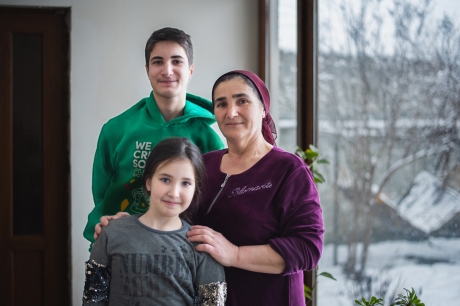Smartphones are boosting gender equality in Georgia and beyond
Women smallholder farmers are leveraging technology and innovation as new agricultural tools
Nestled in the vast plains of Georgia, in the shadows of the snow-covered Caucasus mountains, Malika Machalikashvili’s farm in Pankisi Gorge was once pretty traditional. She and her family shared the day-to-day work of caring for the livestock and poultry, gardening the vegetables and taking care of the hazelnut orchard, along with a few fruit trees and berry bushes. She used to bring the produce to the local market or sometimes even the one in the country’s capital, Tbilisi. Today, on top of the farm’s new additions, such as a greenhouse and modern irrigation, perhaps the most novel change is that she now sells her produce using a smartphone.
For the last three years, Malika has been attending FAO trainings, which are financially supported by the European Union. These practical trainings, provided through Farmer Field Schools, teach smallholder farmers about better agricultural practices. Farmers learn by doing with practical work in demonstration plots and farms. These platforms have also proved very useful for teaching rural men and women about gender equality, gender-based violence and women’s economic empowerment.
In addition, partnering with other organisations, such as the United Nations Population Fund (UNFPA), FAO is also offering gender-sensitive training to communities. These trainings help smallholder women farmers feel empowered to stand up for their rights, grow their businesses and implement successful economic initiatives.
Increased yields, increased opportunity
Using the good agricultural practices she learned, Malika managed to improve soil fertility while also increasing the yields of her fruits and vegetables. With the increased yield, she recognised an opportunity to explore new channels for commerce.
Malika remembers that a Farmer Field School lead farmer from Pankisi, Nino Khakhichashvili, “always used to tell me to post about my produce on social media.”
Inspired by her colleague, Malika followed the advice during the first outbreak of COVID-19. With the help of her 14-year-old grandchild, she got accustomed to taking pictures, recording voice messages, as well as posting on social media and group messaging applications. She gradually attracted the interest of buyers. As a result, digital channels on her smartphone became new platforms for earning income.

